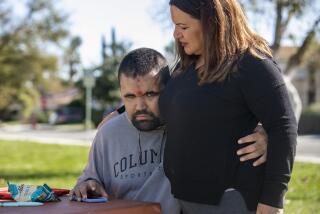They’re Victims With No Voice
- Share via
It is a crime that lurks in the shadows, largely underreported for the reason its victims are targeted in the first place: Beyond being vulnerable, they often are unable to communicate or even fully understand what has been done to them.
Yet experts and advocates say sexual abuse has long been an epidemic among disabled people, who they estimate are four to 10 times more likely to be victimized than the general population.
The physically disabled may not be able to resist an attack. And many of the developmentally disabled are easy prey for the same reasons children are: They trust the adults who care for them.
“It’s a hidden problem,” said Wendie Abramson, director of an Austin, Texas-based group that works with disabled children and adults to educate them of the danger. “The majority of the people we see in counseling say they have been repeatedly sexually assaulted.”
The arrest Wednesday of an Orange County Transportation Authority contract bus driver who is accused of sexually assaulting two mentally disabled passengers is a reminder of the power that aid workers have over the people they’re entrusted to help.
A survey by a Canadian researcher found that nearly 25% of sexual assaults on the disabled were committed by nonrelative caregivers -- and that 7% alone involved providers of transportation.
“That doesn’t sound like a huge number,” said Dick Sobsey, a professor at the University of Alberta. “But can you imagine if 7% of all sexual assaults were done by bus drivers? You’d think that’s a lot.”
Few studies have been done on the sexual assault of disabled adults. One survey of developmentally disabled people found that 83% of the women and 32% of the men interviewed had been assaulted, Abramson said. Yet, she added, only 1% of abuse cases reported to adult protective services in Texas involve a sex crime -- a figure she suspects applies nationwide.
Such gaps point up how underreported these crimes are, experts say.
“There’s a combination of reasons,” said Ben Field, a deputy district attorney in Santa Clara County who has researched the issue. “Sometimes it has to do with the person’s impairment, a difficulty to communicate. It has to do with their social isolation, and their dependence on caretakers.... Some don’t fully understand how to make a report, so they don’t have the same access to the justice system that others have.”
Because of those reasons, such cases can be tough to prosecute, Field and others said. A bill sponsored by California Assemblywoman Sally Lieber (D-San Jose) would allow judges to treat dependent adults much the way children are -- protecting them from certain types of questioning and allowing them to “promise to tell the truth” instead of taking an oath.
“It’s a big issue that needs to be addressed,” said Erica C. Jones, executive director of a Berkeley group that assists people with the Americans with Disabilities Act. “There are certain vulnerabilities that people with disabilities have.... It’s what them a more obvious mark.”
More to Read
Sign up for Essential California
The most important California stories and recommendations in your inbox every morning.
You may occasionally receive promotional content from the Los Angeles Times.












